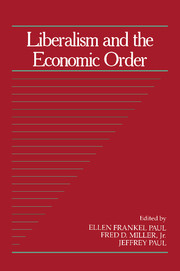Book contents
- Frontmatter
- Contents
- Introduction
- Acknowledgments
- Contributors
- The Social Market Economy
- From Post-Communism to Civil Society: The Reemergence of History and the Decline of the Western Model
- Asymmetrical Reciprocity in Market Exchange: Implications for Economies in Transition
- Institutions, Nationalism, and the Transition Process in Eastern Europe
- The Economic and Political Liberalization of Socialism: The Fundamental Problem of Property Rights
- Democracy, Markets, and the Legal Order: Notes on the Nature of Politics in a Radically Liberal Society
- Liberalism: Political and Economic
- Socialism as the Extension of Democracy
- Liberalism, Welfare Economics, and Freedom
- Some Rules of Constitutional Design
- The Morality of Inclusion
- A New Contractarian View of Tax and Regulatory Policy in the Emerging Market Economies
- Associations and Democracy
- Index
Liberalism, Welfare Economics, and Freedom
Published online by Cambridge University Press: 05 October 2010
- Frontmatter
- Contents
- Introduction
- Acknowledgments
- Contributors
- The Social Market Economy
- From Post-Communism to Civil Society: The Reemergence of History and the Decline of the Western Model
- Asymmetrical Reciprocity in Market Exchange: Implications for Economies in Transition
- Institutions, Nationalism, and the Transition Process in Eastern Europe
- The Economic and Political Liberalization of Socialism: The Fundamental Problem of Property Rights
- Democracy, Markets, and the Legal Order: Notes on the Nature of Politics in a Radically Liberal Society
- Liberalism: Political and Economic
- Socialism as the Extension of Democracy
- Liberalism, Welfare Economics, and Freedom
- Some Rules of Constitutional Design
- The Morality of Inclusion
- A New Contractarian View of Tax and Regulatory Policy in the Emerging Market Economies
- Associations and Democracy
- Index
Summary
With the collapse of the centrally controlled economies and the authoritarian governments of Eastern Europe and the former Soviet republics, political leaders are, with appreciable public support, espousing “liberal” economic and political transformations–the reinstitution of markets, the securing of civil and political rights, and the establishment of representative governments. But those supporting reform have many aims, and the liberalism to which they look for political guidance is not an unambiguous doctrine.
In this essay, I shall be concerned to explore what light, if any, is cast on practical problems facing liberal reformers in Eastern Europe by an examination of some abstract problems concerning the foundations of liberalism and the relations between liberalism and economic theory. I have my doubts about the practical relevance of this philosophical inquiry. Liberal reformers in Eastern Europe and the former Soviet republics have so few humane and nontotalitarian alternatives that the question of which are the most faithful to liberalism may be moot. But I shall nevertheless indulge in the luxury of thinking about the foundations of liberalism and about how a liberal should appraise forms of economic organization. I shall argue that liberalism is not committed to assessing policies by their impact on individual preferences and that despite the many affinities between liberalism and contemporary economic theory, liberals should be wary of welfare economics. There is a good liberal argument for markets, but there are also good reasons for liberals to be concerned to regulate and limit markets.
- Type
- Chapter
- Information
- Liberalism and the Economic Order , pp. 172 - 197Publisher: Cambridge University PressPrint publication year: 1993

